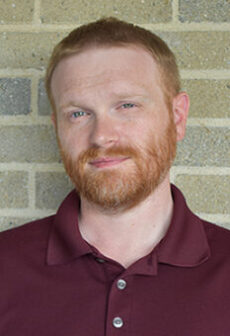The constancy of God is our security

Shawn Reeves
By Shawn Reeves
Twelfth Sunday in Ordinary Time/June 21
Jeremiah 20:10-13; Psalm 69:8-10,14,17,33-35; Romans 5:12-15; Matthew 10:26-33
My wife and I have been married for more than 20 years, and we are not the same people we were when we said our vows. St. John Henry Cardinal Newman once famously wrote, “Growth is the only evidence of life.” Growth is inherently an illustration of change. In marriage people change, as they are meant to. Bodies change. Interests change. Occupations change. But amid all this change, there is one remaining constant — the solemn promises the couple made to love and support one another amid this change (and the obligations attached to those promises).
Human life is ordered toward change, our humanity poised to increase in growth. But the state of growth also has a limitation: it is inherently the absence of permanence. Perhaps it is precisely the inevitability of change that prompted God to ask us to initiate marriage with vows — solemn promises voiced with an honest expectation of change, ensuring something of permanence.
Mankind’s weak nature has proven fluctuating and alterable. God’s nature is permanent and immutable.
Permanence is a luxury few relationships enjoy, as the prophet Jeremiah demonstrates in our first reading. “Those who were my friends,” he announces, “are on the watch for any misstep of mine.” Instead of support, he finds suspicion. Instead of consolation, he finds “terror on every side.” And instead of fidelity, he is met with betrayal. Like the Psalmist who announces “I have become an outcast to my brothers, a stranger to my children,” Jeremiah finds himself transfixed with the pain of contradiction. His one hope is the permanence of God.
Both Jeremiah and the Psalmist place their confidence in the unalterable fidelity of God in contrast with the inconstancy of former friends. In triumphant expectation of God’s permanent disposition toward his well-being, Jeremiah proclaims, “but the LORD is with me.” It is not a testimony of that moment alone but a commentary on the nature of God, on God’s permanent state as the uniquely faithful one.
GOD’S NATURE IS PERMANENT
Even Jesus’ words, “Everyone who acknowledges me before others I will acknowledge before my heavenly Father. But whoever denies me before others, I will deny before my heavenly Father” is a declaration of God’s constancy. It is not Jesus who changes in this scenario; rather, it is the disciple who has altered his or her behavior, provoking and demanding a new outcome. The consequence has changed not because God has become different but because the disciple has. It is a testimony of Jesus’s consistent disposition toward our free choices and actions.
And so it would seem that this Sunday’s readings are riddled with a series of contrasts. Those once considered friends are suddenly found to be enemies and oppressors. God’s permanent character is set in opposition to the fickleness and alterability of humanity. And in the Gospel reading, Jesus distinguishes between things “concealed,” “secret,” and “in the darkness” from what is “revealed,” “known,” and “in the light.” Things “whispered” will become “proclaimed.” And those who can kill the body (but not the soul) are juxtaposed to “the one who can destroy both soul and body in Gehenna.”
In this litany of contrasts and contradictions, Jesus pronounces the qualities of two distinct eras of human destiny: “the pattern of the trespass of Adam” (as our second reading states) and the epoch of the eternal grace of God.
Whereas Adam’s sin led to an era of sin and his one trespass led to an age of transgression and a reign of death, “the one who was to come” (Jesus Christ) ushered in an entirely new era and a renewed human destiny. His “gift” of self-offering is set by St. Paul in contrast with Adam’s sin as two actions that thrust all of humanity into distinct and opposing paradigms: the act of Adam that caused darkness and “death [to come] to all men” contrasted with the “gracious gift” of Jesus that caused God’s grace to “overflow for the many.”
Mankind’s weak nature has proven fluctuating and alterable. God’s nature is permanent and immutable. And in that we can find security and confidently proclaim, “the LORD is with me.”
—
SHAWN REEVES has served as the director of religious education at St. John’s Catholic Newman Center in Champaign since 2001. He and his family attend St. Elizabeth of Hungary Church in Thomasboro.





